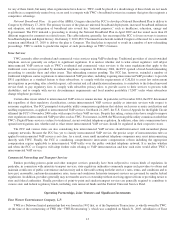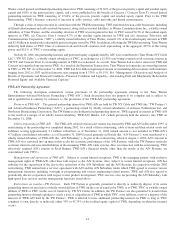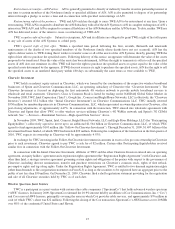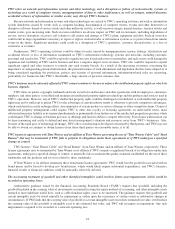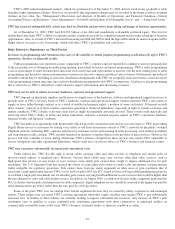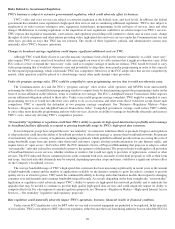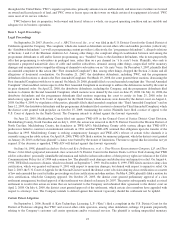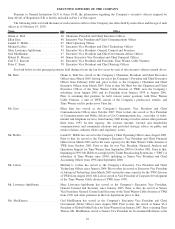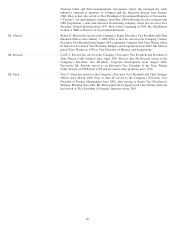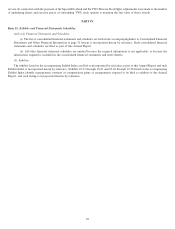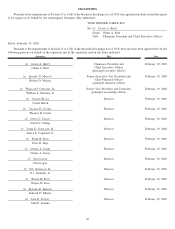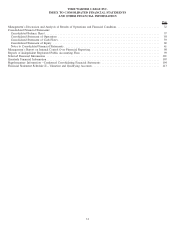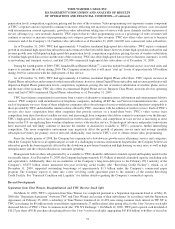Time Warner Cable 2009 Annual Report Download - page 35
Download and view the complete annual report
Please find page 35 of the 2009 Time Warner Cable annual report below. You can navigate through the pages in the report by either clicking on the pages listed below, or by using the keyword search tool below to find specific information within the annual report.throughout the United States. TWC’s signal reception sites, primarily antenna towers and headends, and microwave facilities are located
on owned and leased parcels of land, and TWC owns or leases space on the towers on which certain of its equipment is located. TWC
owns most of its service vehicles.
TWC believes that its properties, both owned and leased, taken as a whole, are in good operating condition and are suitable and
adequate for its business operations.
Item 3. Legal Proceedings.
Legal Proceedings
On September 20, 2007, Brantley, et al. v. NBC Universal, Inc., et al. was filed in the U.S. District Court for the Central District of
California against the Company. The complaint, which also named as defendants several other cable and satellite providers (collectively,
the “distributor defendants”) as well as programming content providers (collectively, the “programmer defendants”), alleged violations
of Sections 1 and 2 of the Sherman Antitrust Act. Among other things, the complaint alleged coordination between and among the
programmer defendants to sell and/or license programming on a “bundled” basis to the distributor defendants, who in turn purportedly
offer that programming to subscribers in packaged tiers, rather than on a per channel (or “à la carte”) basis. Plaintiffs, who seek to
represent a purported nationwide class of cable and satellite subscribers, demand, among other things, unspecified treble monetary
damages and an injunction to compel the offering of channels to subscribers on an “à la carte” basis. On December 3, 2007, plaintiffs filed
an amended complaint in this action (the “First Amended Complaint”) that, among other things, dropped the Section 2 claims and all
allegations of horizontal coordination. On December 21, 2007, the distributor defendants, including TWC, and the programmer
defendants filed motions to dismiss the First Amended Complaint. On March 10, 2008, the court granted these motions, dismissing the
First Amended Complaint with leave to amend. On March 20, 2008, plaintiffs filed a second amended complaint (the “Second Amended
Complaint”) that modified certain aspects of the First Amended Complaint in an attempt to address the deficiencies noted by the court in
its prior dismissal order. On April 22, 2008, the distributor defendants, including the Company, and the programmer defendants filed
motions to dismiss the Second Amended Complaint, which motions were denied by the court on June 25, 2008. On July 14, 2008, the
distributor defendants and the programmer defendants filed motions requesting the court to certify its June 25, 2008 order for
interlocutory appeal to the U.S. Court of Appeals for the Ninth Circuit, which motions were denied by the district court on August 4,
2008. On May 4, 2009, by stipulation of the parties, plaintiffs filed a third amended complaint (the “Third Amended Complaint”) and on
June 12, 2009, the distributor defendants and the programmer defendants filed a motion to dismiss the Third Amended Complaint, which
the district court granted with prejudice on October 15, 2009, terminating the action. Plaintiffs have filed a notice of appeal to the
U.S. Court of Appeals for the Ninth Circuit. The Company intends to defend against this lawsuit vigorously.
On June 22, 2005, Mecklenburg County filed suit against TWE-A/N in the General Court of Justice District Court Division,
Mecklenburg County, North Carolina and on July 1, 2005, the action was removed to the U.S. District Court for the Western District of
North Carolina. Mecklenburg County, the franchisor in TWE-A/N’s Mecklenburg County cable system, alleges that TWE-A/N’s
predecessor failed to construct an institutional network in 1981 and that TWE-A/N assumed that obligation upon the transfer of the
franchise in 1995. Mecklenburg County is seeking compensatory damages and TWE-A/N’s release of certain video channels it is
currently using on the cable system. On April 14, 2006, TWE-A/N filed a motion for summary judgment, which the district court granted
on January 26, 2010 on the basis plaintiff’s claims were barred by the statute of limitations. The time to appeal this decision has not yet
expired. If the decision is appealed, TWE-A/N will defend against this lawsuit vigorously.
On June 16, 1998, plaintiffs in Andrew Parker and Eric DeBrauwere, et al. v. Time Warner Entertainment Company, L.P. and Time
Warner Cable filed a purported nationwide class action in U.S. District Court for the Eastern District of New York claiming that TWE
sold its subscribers’ personally identifiable information and failed to inform subscribers of their privacy rights in violation of the Cable
Communications Policy Act of 1984 and common law. The plaintiffs seek damages and declaratory and injunctive relief. On August 6,
1998, TWE filed a motion to dismiss, which was denied on September 7, 1999. On December 8, 1999, TWE filed a motion to deny class
certification, which was granted on January 9, 2001 with respect to monetary damages, but denied with respect to injunctive relief. On
June 2, 2003, the U.S. Court of Appeals for the Second Circuit vacated the district court’s decision denying class certification as a matter
of law and remanded the case for further proceedings on class certification and other matters. On May 4, 2004, plaintiffs filed a motion for
class certification, which the Company opposed. On October 25, 2005, the district court granted preliminary approval of a class
settlement arrangement, but final approval of that settlement was denied on January 26, 2007. The parties subsequently reached a revised
settlement to resolve this action on terms that are not material to the Company and submitted their agreement to the district court on
April 2, 2008. On July 6, 2009, the district court granted approval of the settlement, which certain class members have appealed with
respect to attorneys’ fees. The Company intends to defend against this lawsuit vigorously should the settlement not be upheld.
Certain Patent Litigation
On September 1, 2006, Ronald A. Katz Technology Licensing, L.P. (“Katz”) filed a complaint in the U.S. District Court for the
District of Delaware alleging that TWC and several other cable operators, among other defendants, infringe 18 patents purportedly
relating to the Company’s customer call center operations and/or voicemail services. The plaintiff is seeking unspecified monetary
23


